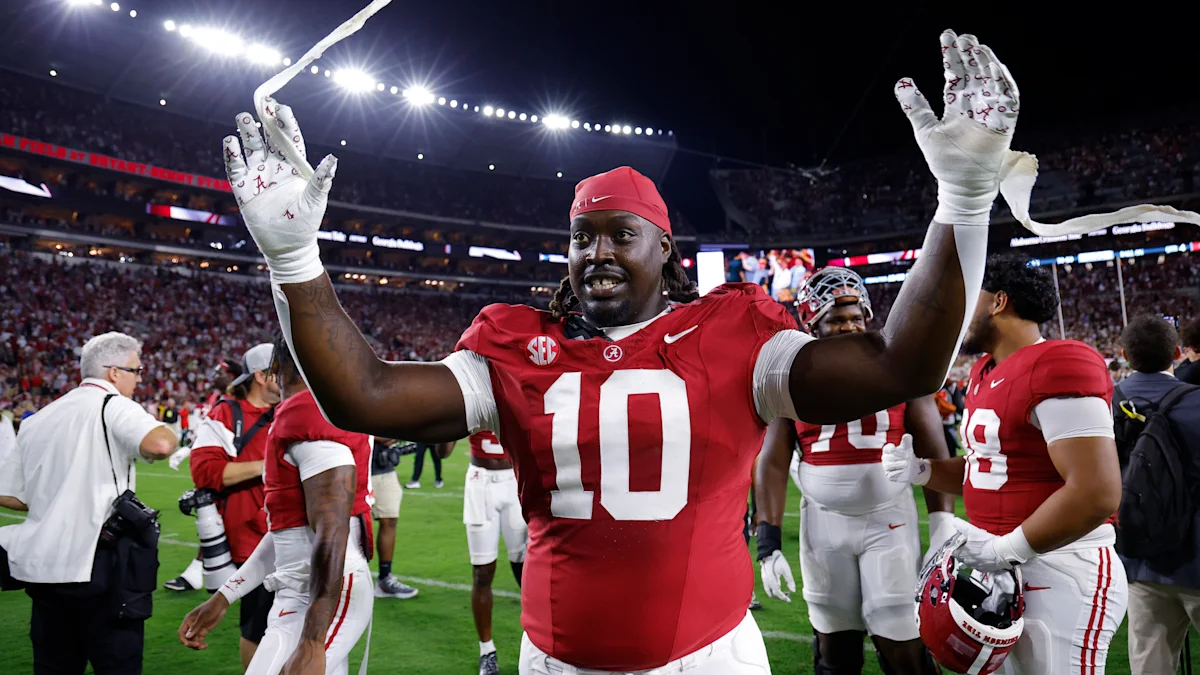Jeheim Oatis, a former defensive lineman for the Alabama Crimson Tide, recently made headlines after publicly revealing that his decision to transfer from Alabama was due to issues with the coaching staff. His statement has added fuel to the ongoing conversation about the evolving nature of college football, the increasing movement within the transfer portal, and the sometimes harsh realities behind the scenes at even the most prestigious programs. While fans often see the glitz and glory of teams like Alabama, players like Oatis are now pulling back the curtain and sharing experiences that challenge the perception of perennial powerhouses.
Oatis, once a highly touted prospect out of Columbia, Mississippi, made an immediate impact in Tuscaloosa. At 6-foot-5 and well over 300 pounds during his high school days, he transformed his body to fit the demands of SEC football. His freshman year at Alabama was marked by flashes of dominance, impressive conditioning improvements, and praise from both teammates and coaches. Fans and analysts believed he was poised to become one of the next great defensive linemen in a program known for churning out NFL talent. But just two seasons into his collegiate career, Oatis decided it was time for a change — and now, he’s finally speaking out about why.
According to Oatis, the core reason behind his transfer was not playing time or NIL deals or any of the typical explanations one might expect in today’s college football world. Instead, he pointed directly at the coaching staff as the driving factor behind his decision. That kind of statement carries weight, especially when it comes from a player who was recruited by Nick Saban and developed under one of the most respected defensive minds in the game. It’s not often that players speak candidly about internal dynamics, especially at Alabama, where a culture of discipline and silence around locker room matters has long been part of the brand. But the new era of athlete empowerment is starting to rewrite that unspoken rule.
Oatis didn’t name individual coaches in his statement, but his general comments suggest a disconnect between himself and the staff’s expectations, communication style, or perhaps overall treatment of players. He described an environment where he felt overlooked, underappreciated, and, at times, even mistreated. The former four-star recruit said that despite his efforts on and off the field — from reshaping his body to performing in big moments — he sensed that his value within the program diminished over time. Whether that’s due to the emergence of other players, coaching changes, or internal politics, the outcome was clear: Oatis no longer felt that Alabama was the right place for his development or well-being.
This revelation sheds light on a reality that’s becoming increasingly visible in major college football: just because a program is successful on the scoreboard doesn’t mean it’s successful for every individual player. For every Heisman winner or first-round draft pick, there are dozens of players trying to find their place, balance their academic and athletic lives, and navigate the intense pressure that comes with playing at a school like Alabama. When the relationship between players and coaches breaks down, it can lead to frustration, confusion, and eventually, departure.
The timing of Oatis’s transfer is also significant. It came during a period of transition for the Crimson Tide, as Nick Saban announced his retirement and the program began adjusting to new leadership. With Kalen DeBoer stepping in as the new head coach, many speculated that some level of roster churn was inevitable. Change at the top often leads to changes throughout a program’s structure, from play-calling philosophies to player evaluations. However, Oatis’s comments indicate that his dissatisfaction began well before the coaching change was official. His statement makes it clear that his frustration stemmed from the old regime, not the incoming staff.
That detail may be especially hard to hear for Alabama loyalists who have long praised the program’s discipline, development, and integrity. But it also serves as a reminder that not every player experiences Alabama the same way. For some, it’s a perfect fit — a launchpad to the NFL and a place to grow. For others, it can become a grind that lacks the personal connection and support needed to thrive. Oatis’s honesty opens the door for more players to share their truths, and it contributes to a broader discussion about how programs can better serve the individuals who make up their teams.
There’s also the human element to consider. College athletes, especially those at the Power Five level, are often treated like commodities. Fans judge them based on performance, social media presence, or recruiting stars, but behind the jersey are young men navigating intense personal journeys. For someone like Oatis — who drastically changed his body, adjusted to life at one of the most demanding programs in the nation, and worked to live up to the hype — the mental and emotional toll of feeling unsupported by the people who are supposed to guide you is immense.
What stands out about Oatis’s story is that he didn’t blame his decision on external factors. He could have easily pointed to the business side of college football, NIL distractions, or even the coaching turnover. Instead, he pointed inward toward the relationships that were supposed to sustain him through the grind. That kind of reflection is rare and powerful. It highlights that, despite the commercialization of the sport, many athletes still prioritize connection, respect, and trust over fame or fortune.
The college football world is changing rapidly, and players like Jeheim Oatis are part of that change. The transfer portal, once a rarely used option, is now a central feature of the sport. Athletes no longer have to stay silent or stick it out in situations that are damaging to their development. Instead, they have the tools and the platform to speak their truth, seek better environments, and take control of their futures. Oatis’s comments will resonate with many players across the country who are wrestling with similar decisions.
It’s also worth noting that while his departure may be viewed as a loss for Alabama in terms of on-field talent, it could also serve as a wake-up call for the program’s internal dynamics. When players of Oatis’s caliber leave and later speak about negative experiences with coaches, it’s a signal that something needs to be re-evaluated. Whether that means changing how coaches communicate with players, offering more support, or creating better feedback loops, the goal should always be to build an environment where players feel seen, heard, and valued.
As for Oatis, his future remains bright. He enters the next chapter of his college career with a renewed sense of purpose and, likely, a deeper understanding of what he needs from a coaching staff and team culture. Wherever he lands, he’ll bring not just physical tools, but also the mental toughness that comes from enduring the pressure cooker of Alabama football. He’s already shown the willingness to bet on himself — to walk away from a top-tier program because it no longer aligned with his values or goals.
In many ways, Oatis’s decision is a microcosm of a larger shift happening in college sports. Players are beginning to reclaim their narratives and demand accountability from the systems around them. They’re no longer content to suffer in silence or remain loyal to programs that fail to reciprocate that loyalty. The power dynamic is shifting, and while that may cause discomfort for traditionalists, it ultimately leads to a healthier, more honest version of college athletics.
Jeheim Oatis’s story isn’t one of failure or bitterness — it’s a story of growth, resilience, and self-awareness. He left a premier program not because he couldn’t cut it, but because he recognized that his experience there no longer served his best interests. That takes courage. And while fans and pundits will speculate about the behind-the-scenes details, Oatis has already moved forward with clarity and conviction. His words remind us that even in the high-stakes world of SEC football, it’s the human element — the relationships, the trust, the respect — that makes all the difference.



